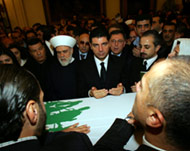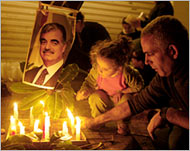Fury at al-Hariri’s funeral
Former prime minister Rafiq al-Hariri has been laid to rest in central Beirut amid scenes of anger as thousands of mourners poured into the streets chanting anti-Syrian slogans.

Draped in a Lebanese flag, al-Hariri’s casket arrived on Wednesday with some difficulty to the unfinished Muhammad al-Amin mosque, which is located in downtown Beirut, the district he helped to rebuild and transform from a forgotten ghost area during the Lebanese civil war into a major tourist attraction.
Tens of thousands of people lined the streets along the 3.2km route taken by the funeral procession. Thousands of others thronged the roads, effectively blocking the ambulance that was carrying al-Hariri’s body from reaching the burial site, located just outside the mosque.
“Syria get out, Syria get out,” yelled the crowds. A woman in black shouted hysterically: “Syria messed up Lebanon. Let them get out of here. I don’t want to see a Syrian face.”
Others called on the government to resign. “We don’t recognise the current government. They are ruling us by force,” Radwan Itani, 45, said.
Sense of gratitude
People who are opposed to Syria consider the government headed by Prime Minister Umar Karami a product of the controversial Syrian-inspired amendment of the Lebanese constitution that allowed President Emile Lahud to extend his term for another three years last September.
 |
|
Al-Hariri was killed in a massive |
Many of those crowding Beirut’s streets on Wednesday had an overwhelming feeling of gratitude to al-Hariri, who they said changed their lives, and decided to come from distant areas to say farewell to him.
“My brother was among the many students who were granted a scholarship from the Hariri Foundation,” Khalid Jarrah, 43, who came from the Bekaa in eastern Lebanon, said. “Since then, my brother has had a decent job and the financial situation of my family has improved.”
Most mourners were wearing black, holding al-Hariri’s pictures and waving black flags. Others waved Druze leader Walid Jumblatt’s Progressive Socialist Party flags.
Shortly after al-Hariri’s assassination, Jumblatt reportedly received a call from UN special envoy Terje Roed-Larsen, who advised him to take maximum security precautions to protect himself.
Jumblatt turned strongly against the Syrian presence in Lebanon following the extension of Lahud’s term.
Already guilty
Official investigations into Monday’s blast that killed al-Hariri are still under way. But many Lebanese have already accused Syria of plotting the murder of their former prime minister.
A total of 17 people, including al-Hariri and his bodyguards, were killed and more than 130 wounded in the explosion.
 |
|
Eldest son Bahaa al-Din pays his |
Al-Hariri’s family and proteges had made it clear to top Lebanese officials, such as Lahud, Karami and Interior Minister Sulaiman Franjiah, that they were not welcome to attend the funeral.
When one young man was asked what he would do if one of the pro-Syrian officials showed up, he said: “It’s better for their safety not to come here.”
Al-Hariri’s supporters also declared allegiance to his eldest son Bahaa al-Din, calling on him to follow in his father’s footsteps and preserve his legacy.
“By our blood and souls, we sacrifice ourselves to you Bahaa,” chanted hundreds of mourners.
People who attended al-Hariri’s funeral were not all his supporters. “I disagreed with many of his policies,” Nizar Dandim, a teacher, said.
“But I can’t deny the energy he had put in everything he worked on,” he added, citing the ex-premier’s reconstruction of Beirut international airport, downtown Beirut and the roads that were badly damaged during the war.
Financial fallout
Lebanese who opposed al-Hariri blamed him for his reconstruction policies that they said plunged the country into massive public debt that reached a high of 185% of the gross domestic product.
 |
|
A father and daughter lighting |
Others worried about the impact of the self-made billionaire’s death on Lebanon’s economy. “He was controlling the financial situation,” said a man who preferred to stay anonymous. “Now after his death, we cannot envisage what will happen.”
Ghinwa Rifaat, 25, an employee at a bank in Beirut, who was taking part in the funeral, said: “I’m afraid investors might start pulling their money out of Lebanon.”
Upon arriving two hours late at the large tent erected to accommodate dignitaries outside the mosque, al-Hariri’s casket was held up by his supporters. People wept loudly and uncontrollably. Men held their hands upwards chanting repeatedly, “There is no God but Allah.”
Laid to rest
Prayers for al-Hariri’s soul were delayed for another hour as the crush of mourners hindered the prayers from being properly held. The organiser repeatedly asked people to move back but the crowds insisted on coming as close to the coffin as they could.
Al-Hariri’s eldest son, Bahaa al-Din, took the microphone from the organiser and appealed to the people to move away. “We want to pray for his soul. Please move backwards. Don’t let his last moments be spent this way,” he shouted.
After the prayers were held, al-Hariri’s body, which was wrapped with a kafan (a piece of cloth in which the dead are wrapped), was removed from the wooden casket and he was finally laid to rest in his grave.